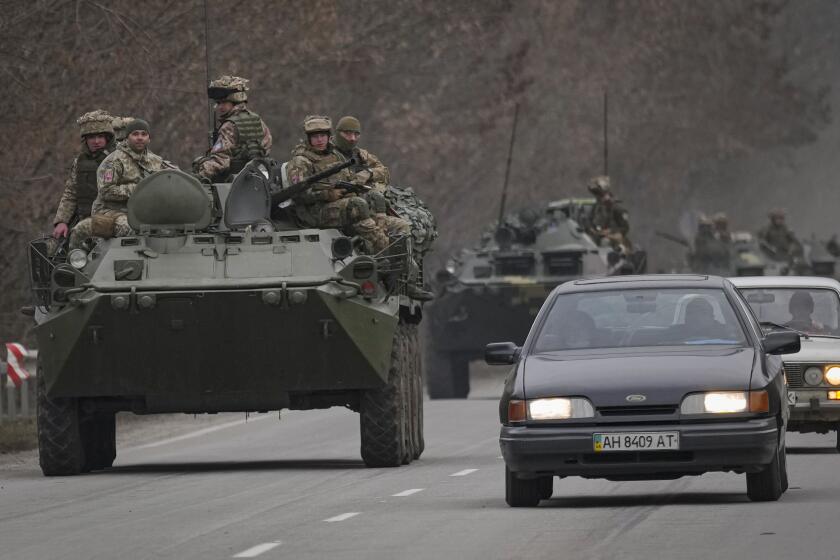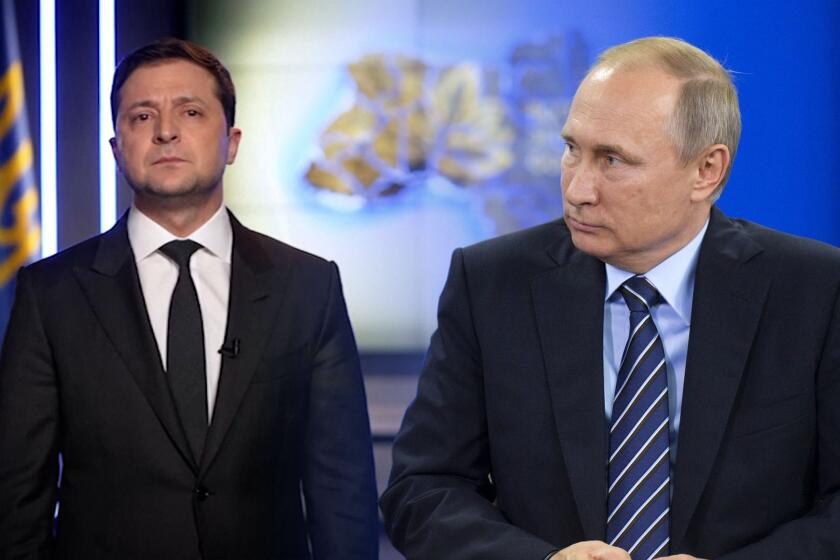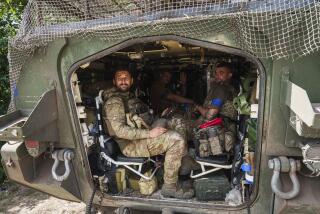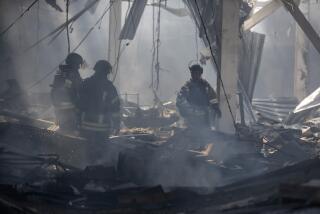‘We don’t support this war’: Hundreds arrested as Russians protest Ukraine invasion
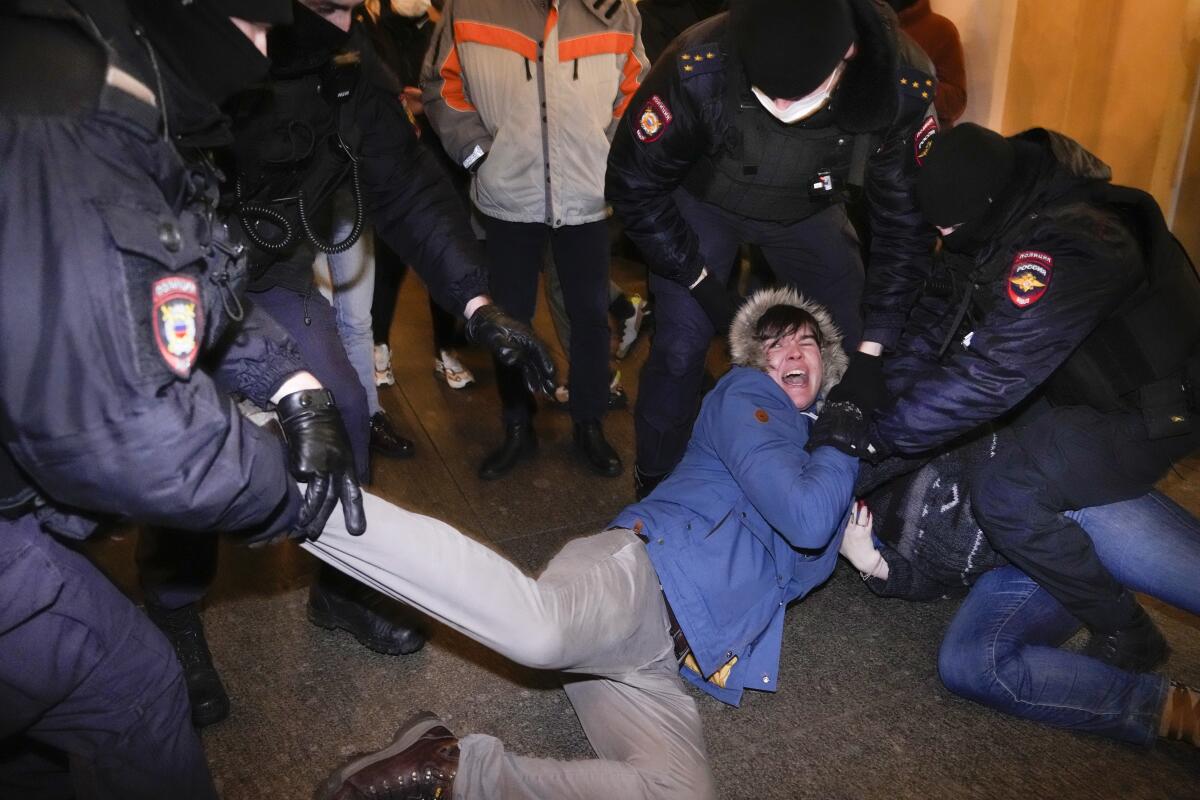
- Share via
MOSCOW — Shocked Russians turned out by the thousands Thursday to decry their country’s invasion of Ukraine as emotional calls for protests grew on social media. Some 1,745 people in 54 Russian cities were detained, including at least 957 in Moscow, according to rights group OVD-Info.
Hundreds of messages were posted condemning Moscow’s most aggressive actions since the 1979 Soviet invasion of Afghanistan. Russian President Vladimir Putin called the attack a “special military operation” to protect civilians in eastern Ukraine from “genocide” — a false claim the U.S. had predicted would be used as a pretext for invasion, and which many Russians roundly rejected.
Tatyana Usmanova, an opposition activist in Moscow, wrote on Facebook that she thought she was dreaming when she awoke at 5:30 a.m. to the news, which she called “a disgrace that will be forever with us now.”
“I want to ask Ukrainians for forgiveness. We didn’t vote for those who unleashed the war,” she said.
As sirens blasted in Kyiv, Ukraine’s capital, and large explosions were heard there and in other cities, Russians were signing open letters and online petitions demanding the Kremlin halt the assault, which the Ukrainian health minister said had killed at least 57 Ukrainians and wounded dozens more.
“Public opinion is in shock, people are in shock,” political analyst Abbas Gallyamov told the Associated Press.
Russian tanks and troops crossed into Ukraine on Thursday after a night of shelling. But why is Russia attacking Ukraine? What is Putin’s goal?
One petition, started by a prominent human rights advocate, Lev Ponomavyov, garnered over 150,000 signatures within several hours and more than 330,000 by the end of the day. More than 250 journalists put their names on an open letter decrying the aggression. Another one was signed by about 250 scientists, while 194 municipal council members in Moscow and other cities signed a third.
“I’m worried about the people very much, I’m worried to tears,” said Zoya Vorobey, a resident of Korolyov, a town outside Moscow, her voice cracking. “I’ve been watching television since this morning, every minute, to see if anything changes. Unfortunately, nothing.”
Several Russian celebrities and public figures, including some working for state TV, spoke out against the attack. Yelena Kovalskaya, director of a state-funded Moscow theater, announced on Facebook that she was quitting her job, saying “it’s impossible to work for a killer and get paid by him.”
“I know that right now many of you feel desperation, helplessness, shame over Vladimir Putin’s attack on the friendly nation of Ukraine. But I urge you not to despair,” human rights activist Marina Litvinovich said in a video statement on Facebook, calling for mass protests Thursday evening.
“We, the Russian people, are against the war Putin has unleashed. We don’t support this war, it is being waged not on our behalf,” Litvinovich said.
But the authorities were having none of that.
In Moscow and other cities, they moved swiftly to crack down on critical voices. Litvinovich was detained outside her residence shortly after posting the protest call.
Russia’s Investigative Committee issued a warning Thursday afternoon reminding Russians that unauthorized protests are against the law.
Russian forces close in on Ukraine’s capital in what the U.S. says is an attempt to topple elected President Volodymyr Zelensky and his government.
Roskomnadzor, the state communications and media watchdog, demanded that Russian media use “information and data they get only from official Russian sources.” Some media reported that employees of certain state-funded companies were instructed not to comment publicly on the events in Ukraine.
Human rights advocates warned of a new wave of repression on dissent.
“There will be new [criminal] cases involving subverters, spies, treason, prosecution for antiwar protests, there will be detentions of journalists and bloggers, those who authored critical posts on social media, bans on investigations of the situation in the army and so on,” prominent human rights advocate Pavel Chikov wrote on Facebook.
“It is hard to say how big this new wave will be, given that everything has been suppressed already.”
Despite the pressure from the authorities, more than 1,000 people gathered in the center of Moscow Thursday evening, chanting, “No to war!” as passing cars honked their horns.
Hundreds also took to the streets in St. Petersburg and dozens in Yekaterinburg.
“This is the most shameful and terrible day in my life. I even was not able to go to work. My country is an aggressor. I hate Putin. What else should be done to make people open their eyes?” Yekaterina Kuznetsova, a 40-year-old engineer who joined the demonstration in St. Petersburg, told the AP.
Meanwhile, Valentina Matviyenko, speaker of the upper house of parliament, charged that those who spoke out against the attack were only caring about their “momentary problems.”
State TV repeated what Putin said in his televised address announcing the attack.
Russia 1 TV host Olga Skabeyeva called it an effort “to protect people in Donbas from a Nazi regime” and said it was, “without exaggeration, a crucial junction in history.”
More to Read
Sign up for Essential California
The most important California stories and recommendations in your inbox every morning.
You may occasionally receive promotional content from the Los Angeles Times.
